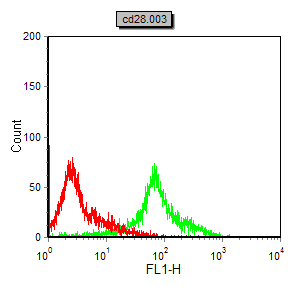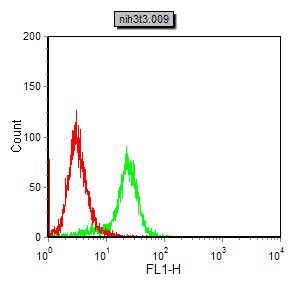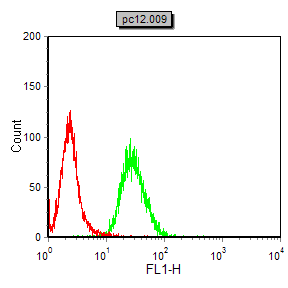


| WB | 咨询技术 | Human,Mouse,Rat,African Green Mouseonkey |
| IF | 咨询技术 | Human,Mouse,Rat,African Green Mouseonkey |
| IHC | 咨询技术 | Human,Mouse,Rat,African Green Mouseonkey |
| ICC | 技术咨询 | Human,Mouse,Rat,African Green Mouseonkey |
| FCM | 1/200 - 1/400 | Human,Mouse,Rat,African Green Mouseonkey |
| Elisa | 咨询技术 | Human,Mouse,Rat,African Green Mouseonkey |
| Aliases | Tp44 |
| Entrez GeneID | 940 |
| clone | 3E7H2 |
| WB Predicted band size | 25kDa |
| Host/Isotype | Mouse IgG1 |
| Antibody Type | Primary antibody |
| Storage | Store at 4°C short term. Aliquot and store at -20°C long term. Avoid freeze/thaw cycles. |
| Species Reactivity | Human,Mouse,Rat,African Green Mouseonkey |
| Formulation | Purified antibody in PBS with 0.05% sodium azide |
+ +
以下是关于CD28抗体的3篇代表性文献及其摘要概括:
---
1. **文献名称**:*CD28 Superagonist Antibodies Trigger a Fatal Cytokine Storm in Humans: Insights from the TGN1412 Trial*
**作者**:Suntharalingam, G. et al.
**摘要**:本文报道了TGN1412(一种CD28超激动抗体)的首次临床试验,该抗体旨在选择性激活调节性T细胞(Treg)。然而,受试者出现严重的全身性炎症反应(细胞因子风暴),揭示了CD28超激动剂在人体中不可预测的免疫激活风险,强调了抗体设计及临床前模型的重要性。
---
2. **文献名称**:*Selective Expansion of Functional Regulatory T Cells by CD28 Antibody Stimulation in vitro*
**作者**:Blazar, B.R. et al.
**摘要**:研究通过抗CD28单克隆抗体体外扩增调节性T细胞(Treg),发现其能显著增强Treg的抑制功能,并在小鼠移植物抗宿主病(GVHD)模型中有效抑制病理反应,为自身免疫疾病和移植排斥的细胞治疗提供了新策略。
---
3. **文献名称**:*CD28 Costimulation in CAR-T Cells Enhances Persistence and Antitumor Efficacy*
**作者**:Porter, D.L. et al.
**摘要**:探讨CD28共刺激结构域在CAR-T细胞中的作用,发现含CD28的CAR-T细胞在白血病患者中表现出更强的扩增能力和持久性,显著提高肿瘤清除效果,为优化CAR-T疗法提供了关键依据。
---
这些研究分别从毒性机制、治疗应用及技术优化角度揭示了CD28抗体的多面性,涵盖免疫治疗的风险与潜力。
CD28 is a critical co-stimulatory receptor expressed on T cells, playing a pivotal role in adaptive immune responses. As a member of the immunoglobulin superfamily, CD28 interacts with ligands CD80 (B7-1) and CD86 (B7-2) on antigen-presenting cells, providing a secondary signal required for full T cell activation alongside T cell receptor (TCR)-mediated antigen recognition. This "two-signal" mechanism ensures immune specificity while preventing autoimmune activation.
CD28-targeting antibodies emerged as therapeutic tools to modulate immune responses. Early research focused on developing CD28 superagonist antibodies (e.g., TGN1412) designed to directly activate T cells without TCR engagement. However, the catastrophic cytokine storm during a 2006 Phase I trial of TGN1412 highlighted the risks of systemic CD28 overstimulation, prompting revised safety protocols for immunomodulatory antibodies.
Subsequent research explored CD28 antagonists to dampen pathological immune activation in autoimmune diseases. Current strategies emphasize controlled co-stimulation, often through bispecific antibodies pairing CD28 engagement with tumor-targeting domains. In cancer immunotherapy, CD28 co-stimulation is being investigated to enhance CAR-T cell persistence and efficacy, though safety concerns persist regarding potential off-target activation.
Modern CD28 antibody engineering prioritizes spatial control of activation, with approaches like conditional activation in tumor microenvironments or pairing with checkpoint inhibitors. These developments reflect evolving insights into balancing therapeutic immune modulation with systemic toxicity risks.
×